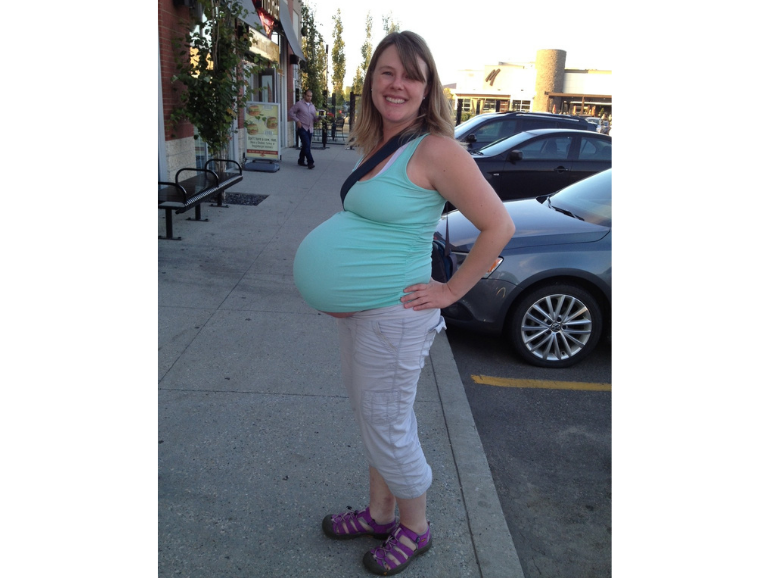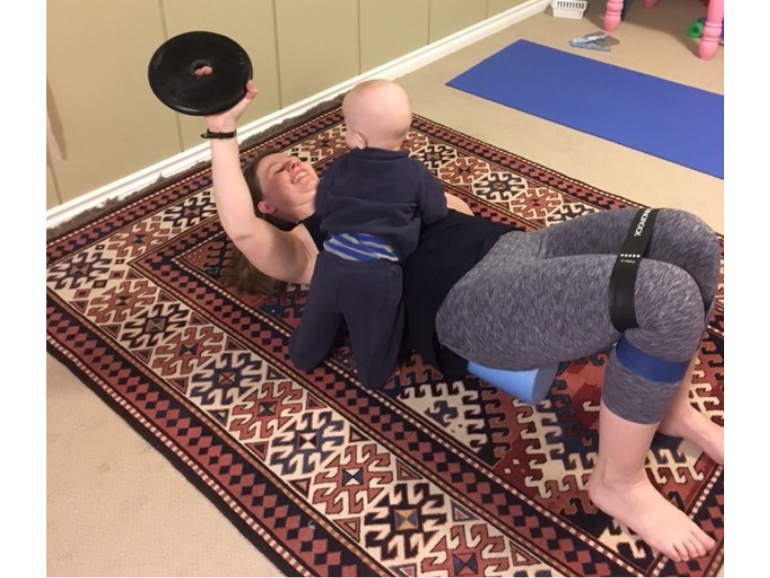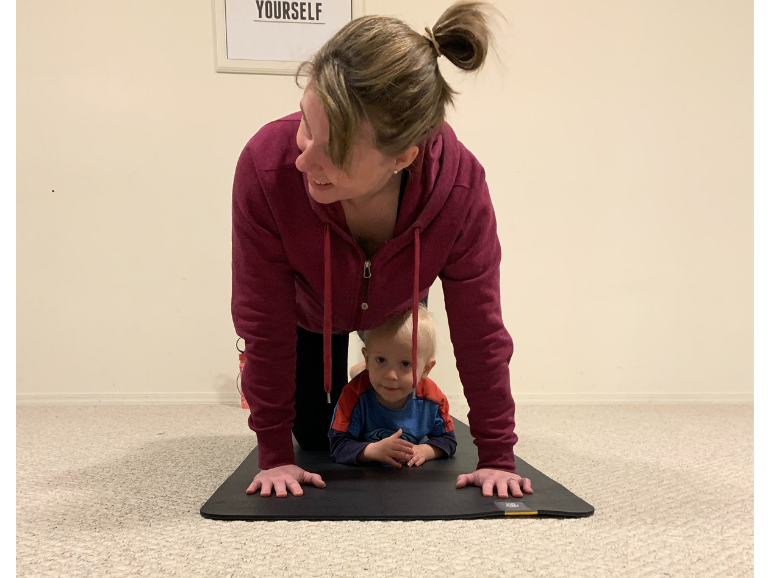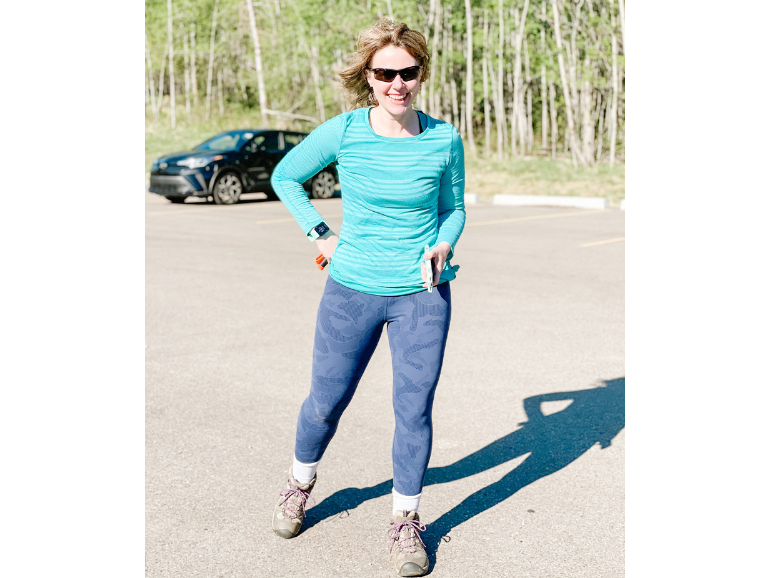Lessons In Exercise After 3 Kids and My 30’s
PART 1
In early June I turned 40. I LOVE birthdays, and I was pretty excited about this one because 40 is what I call a milestone birthday. I love milestones because they work as nice benchmarks to measure how far we have traveled on our journeys, but they also remind us there is more to come. A birthday is always better than the alternative, right?! Milestones allow us to reflect on our past, soak up a celebration in the moment (yay, I’ve made it this far!), and possibly even plan for the future.
As I got to reflecting, I decided I wanted to write about what I’ve learned over the last decade about exercise. These are my own lessons from traveling in my body through my 30’s (and also growing and birthing 3 babies in that time), but I’ve also spent over a decade working with women in my pelvic health physiotherapy practice. There have been many knowledge and experience gems to uncover – some unearthed fairly easily, and some the hard way. I’m fairly confident I’m heading into my 40’s not just older, but also wiser and stronger. Perhaps some of you might find these reflections interesting and applicable in your own lives too.
Heads up: this is a longer form, deep dive blog post so grab a cup of your favourite beverage and enjoy! You can definitely come back to this over multiple visits too.
I’ve distilled my reflections down into 5 themes. The first 2 are below; themes 3, 4 & 5 will be in Part 2. Stay Tuned 😉
1. Our Bodies Always Change
Our physical bodies change as we age, but also through the process of matrescence (more on this word in a moment). When it comes to aging, I often wrestle with what feels like a huge disservice from the Hollywood and mainstream media communities. It’s totally unfair, and honestly CRAZY that I (and loads other women/people) have been led to believe that we should travel through decades of our lives and look exactly. the. same.
My body is not the same. Your body is not the same. Our bodies SHOULDN’T be the same. Nothing about you should be the same. Change is normal. If I told you that 10 years from now, you would be exactly the same – would you really want to be? I’m betting you actually wouldn’t. When I look back on my last ten years, I can say I know myself more deeply. I have a better understanding about who I am as a person, and about what it takes to make me happy. I’m a better problem-solver, a better parent, a better community member, a better physio. I certainly don’t want to be my 20 year-old self again!
We are always aging. Constantly. We are always changing. Constantly. It’s one of the fundamental truths of life.
And that’s not even considering matrescence.

It’s amazing how much a belly can adapt and change to grow a baby…
Matrescence
Matrescence is one of my favourite words, but it’s a concept that needs definition and a whole lot more attention. My favourite working definition of matrescence comes from Dr. Aurélie Athan1:
“The process of becoming a mother, coined by Dana Raphael, Ph.D. (1973), is a developmental passage where a woman transitions through pre-conception, pregnancy and birth, surrogacy or adoption, to the postnatal period and beyond. The exact length of matrescence is individual, recurs with each child, and may arguably last a lifetime! The scope of the changes encompass multiple domains –bio-psycho-social-political-spiritual– and can be likened to the developmental push of adolescence. Increased attention to mothers has spurred new findings, from neuroscience to economics, and supports the rationale for a new field of study known as matrescence. Such an arena would allow the roundtable of specialists to come together and advance our understanding of this life passage.”
There are so many things I love about this definition, but I particularly like how Dr. Athan draws a parallel between matrescence and adolescence. This makes such perfect sense given the hormonal and physical changes our bodies experience – remember all the crazy hormone and body changes from your teen years? Doesn’t pregnancy kind of feel like that?
I also love the idea of a bio-psycho-social-political-spiritual model. Today I’d like to use this blog to zone in on the “bio” or the physical portion of that model. However, although I’m focusing on the physical, I don’t wish to undermine the complexity of the changes we go through as we grow and birth babies, and become mothers. We are totally whole, complex beings.
Human bodies are complex, but they are also AMAZING! I truly believe that all human bodies are resilient and adaptable. It’s actually an incredibly miraculous feat of nature to grow and birth a baby, but the adaptations we undergo often lead to persistent or permanent change. That’s okay! Your heart and mind have changed (in fact your brain changes enormously during these times!). You are forever changed as a mother, why shouldn’t your physical body be changed as well?
What if we prepared people in advance to accept the changes as they come, instead of trying to hide that they happen? What if we actually celebrated these changes? How would the world be different?
These changes then lead me to my next point:
2. Because our bodies have changed, our exercise often needs to change too.
There are so many reasons why your physical activity and exercise has most likely needed some change and adaptation. Some of these reasons could include:
A) Less sleep:
You could be getting less sleep at the end of pregnancy; in the earlier post-partum period; with hormonal changes; due to stress, etc. However, good sleep is essential for a thriving life. Without good sleep, your exercise capacity can’t be its best. This is because:
- Sleep allows time for our cells and tissues to repair; without it we have slower muscle recovery. Without sleep, we aren’t going to handle exercise progression and intensity as well.
- Proper sleep also influences the body’s stress response. Sleep disturbances have a powerful influence on the risk of infectious disease, the occurrence and progression of several major medical illnesses including cardiovascular disease and cancer, and the incidence of depression.2
- Some studies have shown chronic lack of sleep is associated with increased rates of injury3, and sleep and pain are related too4.
The reality is many of us don’t get enough sleep, especially parents! If you aren’t sleeping, your exercise needs to change.
B) Tissue and hormonal level changes:
Through pregnancy and the post partum period, your hormones are changing a lot, and that induces a lot of physical change in your body. Your pelvic ligaments soften and stretch to accommodate the growth of your baby, and your abdominal wall and pelvic floor muscles sure change too! There can also be many other body changes (breasts, brain, butts, etc.). The human body is great at adaptation, but it takes time. While your body is recovering from those changes, it might be a whole lot better to try out some different exercise that feels better in your body. This could be a change in the type of exercise, or the intensity, or in any of the other ways exercise can be modified.
C) Time constraints:
I pretty much never workout by myself now. I can sometimes squeeze in a walk or a run by myself, but strength training almost always includes my children. Sometimes they play nicely beside me, but sometimes they steal my equipment, crawl on top of me, or need me to referee for some fight. My reality is that as a business owner and mother of 3, I don’t have a lot of free time – I certainly don’t have 1.5 hours to hit the gym in the way I used to. One of my Covid silver linings was learning how much I could really do with a home workout, and with my kids. I had to figure that out – I just couldn’t get in the physical activity I wanted to otherwise.
The good news is: I’ve seen more changes in my body in the last 6 months than I have in the last 4 years since the birth of my youngest. There are probably many reasons for this (getting more sleep, hormonal stabilization and consistency being the first big three that come to mind), but I haven’t hit a gym in over 2 years. What exercise looks like for me has completely changed, yet I’m still making gains and progress and seeing “results”.
It is not a failure to exercise differently as your body changes. It is quite the opposite – it is a very wise move to honour how you feel in your body. Let me repeat: your body is different. It is changing or has changed. It is also wise to take some time to get familiar and acquainted with all the ways in which your body has changed. Learn it anew.
And if you suffer with any physical challenges after birth like incontinence, or pelvic organ prolapse, you will definitely need some time to learn and navigate the changes in your body.


In addition to giving yourself time to learn your body anew, I encourage you to give yourself grace (my definition for grace is courteous goodwill, kindness or mercy). It’s not always easy to make peace with the changes we are experiencing. We may grieve over some of our body experiences. We may feel like some parts are broken or lost. That might be your reality at some points, it sure has been for me. And guess what – you don’t have to love all the changes. I wish I could love all the ways my body has changed. I love some of them, but some of them I don’t.
But here’s a tip – you don’t have to hate them either. One of my good friends, Kaye Burrows from Core Love Fitness, has a great question for her clients when it comes to noticing these changes. Instead of perhaps oscillating between total love or pure hatred for our bodies, she might ask, “what about taking a neutral stance?”. What about just being a bit curious, not falling off the edge either way and just saying – huh, that’s interesting… my body is different. What if we don’t assign meaning to the changes right away? What if we just get neutral about it? It’s a super interesting thought exercise and one I’ve found helpful at many points over the last 4 years.
Healing takes time and grace, but we also need curiosity. The scientist in me had to come out: I had to start experimenting to see what actually felt good now (and to be honest about what didn’t). You might be surprised to discover new, exciting things (I’ve discovered yoga, belly dancing and heavier lifting in the last decade; I’ve also rediscovered my love of hiking). I really encourage you to get curious, experiment, and don’t forget to come back to play and joy. You absolutely deserve to feel awesome in your body.

Goin’ for a hike and feelin’ happy!
A SIDE NOTE:
These changes (especially those that feel scary, negative, or detrimental) DO NOT mean we have to stop everything, or kill all the intensity, or never go back to physical activity that we love.
It might mean we make some changes in the short term to build our capacity back up to a place where we can handle increased physical demands on our system. As Antony Lo (The Physio Detective) would say: its just for now, not forever.
The same principles of exercise still apply at ALL ages and stages in life. Here are some important ones to consider:
Specificity:
If you want to get better at something, you have to do that thing (like being sport-specific and training for your sport; or being a parent and training for function – like hauling that bucket seat around, or getting up and down off the floor while playing with your kids. Let’s not forget motherhood is physically demanding in itself!)
Overload:
For adaptations in our bodies to occur (ex. getting stronger, building more endurance or speed, etc.) the volume of exercise/activity must overload the body in some way. The kicker here is that the overload has to be in line with our current capacity. If we overload too far, we can get injured. Basically, you get improvements by doing a bit more; however, if you have changed, your capacity has probably changed too…
Progression:
Further to the idea of overload, we have to keep overloading progressively. As your body adapts, you have to challenge it a little further. We see our improvements now by doing a little more and a little more over time. If you find your capacity is less than before, it can still be built up!
So the big question is:
Where is your body at NOW? You need to evaluate your starting point. If you have changed (ex. you had a baby or 5 babies, you’ve worked in a sedentary job for the last 10 years, your hormonal profile has changed, you’ve been injured, etc.), you could have a different starting point then you did when you were 19, or 25, or 30. Your physical activity and exercise probably need to change. AND THAT’S OKAY.
There are also seasons and cycles to life. You might be in a season of life (like the early weeks with a newborn) that necessitates a lot of changes to what your physical activity, movement and exercise look like. Other seasons might better serve bigger increases in intensity and training. And then life happens, and it can all change again. Ride the waves friends!
Ride the waves, but watch out for the crashes.
This brings me to theme # 3 (exercise should nourish and not deplete you) which you can find in Part 2 – coming soon!
Thanks for reading this far! I’m looking forward to sharing more soon.
Stay Tuned…
![]()
~Mandy
References:
- https://www.matrescence.com/
- Irwin, Michael R. Why Sleep Is Important for Health: A Psychoneuroimmunology Perspective. Annu Rev Psychol. 2015 Jan 3; 66: 143–172. Published online 2014 Jul 21.
- Gao B, Dwivedi S, Milewski MD, Cruz AI Jr.. Chronic Lack of Sleep Is Associated with Increased Sports Injury In Adolescents: A Systematic Review and Meta-Analysis. Orthop J Sports Med. 2019;7(3 Suppl):2325967119S00132. Published 2019 Mar 29.
- Finan PH, Goodin BR, Smith MT. The association of sleep and pain: an update and a path forward. J Pain. 2013;14(12):1539-1552.
